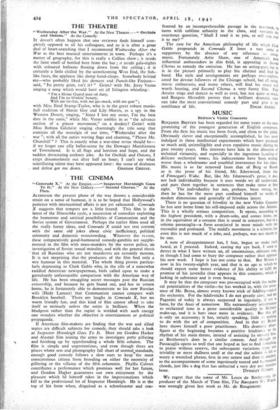MUSIC
Britten's Violin Concerto
BENJAMIN BarrrEra has been regarded for some years as the most promising % of the youngest generation of English composers. From the first his music has been fresh, and clean to the palate. Obviously clever and exceptionally accomplished, he has never indulged in those intellectual experiments which have produced so much arid, unintelligible and even repulsive music during the past twenty years. His interests have lain in the direction of technical virtuosity, and especially in the ingenious h.mdling of delicate orchestral tones; his indiscretions have been nothing worse than a wholesome and youthful irreverence for his elders. His music is as far removed from that of Berg or Bartok as is the prose of his friend, Mr. Isherwood, from that of Finnegan's Wake. But, like Mr. Isherwood's prose, it does not lack individuality because it uses words we all understand, and puts 'them together in sentences that make sense at first sight. The individuality has not, perhaps, been strong, but then he has 'for the most Part confined himself to works of modest dimensions and generally of frivolous intent. There is no question of frivolity in the new Violin Concerto he has sent home from his self-imposed exile across the Atlantic. This is a wholly serious composition. It opens; according to the highest precedent, with a drum-solo, and comes home, not in the equivalent of a .coranto that is usual in concertos, but in a solemn passacaglia—a form associated in most minds with the recondite and profound. The middle movement is a scherzo, but even this is not much of a joke, and, perhaps; was not meant to be one.
A note of disappointment has, I fear, begun to make itself. heard, as I proceed. Indeed, casting my eye back, I seem to detect in what I have written an, all unconscious, obituary tone, as though I had come to bury the composer rather than appraise his new work. I hope it has not come to that. But Britten is now in his twenty-eighth year, and that is an age at which we should expect some better evidence of his ability to fulfil the promise of his juvenilia than appears in this concerto, which is lacking in substance and is even boring.
It may be that the composer was pre-occupied with the techni- cal potentialities of the violin—he has worked in, with the assist- - ance of Mr. Brosa, almost every known trick of fiddling—and of the orchestra. For the fiddlesticks I do not greatly care; and the Paganini of today is always surpassed in . ingenuity, if not in fame, by the Auer of tomorrow. His extraordinary sensitiveness to orchestral tone is a /pore considerable quality in Britten:5. make-up, and it is here once more in evidence. But this P is only an accessory; it has, strictly speaking,-little or nothing to do with the art of composition. And in that art Britten here shows himself a poor practitioner. His dramatic drum' figure at the beginning becomes a positive hindrance to We rhythm of. his main theme, instead of assisting its onwarde. flow' as Beethoven's does in a similar context. And though the
..,„
Passacaglia opens so well that one hoped at last to find something to praise without reserve, the subsequent variations inPse into
is left w triviality or mere dullness until at the end the soloist worry a wretched phrase, first in one octave and then in another! 'sed to the accompaniment of some ingeniously scored and harmom
chords, just like a dog that has unburied a very dry and meatless bone. • DYNELEY HUSSEY'


























 Previous page
Previous page